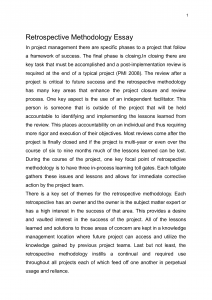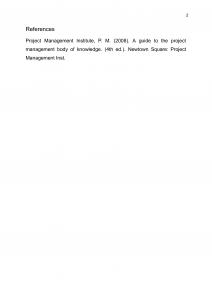Toll-Free US & Canada 24/7:
1-770-659-7014
As a precautionary health measure for our support specialists in light of COVID-19, our phone support option will be temporarily unavailable. However, orders are processed online as usual and communication via live chat, messenger, and email is conducted 24/7. There are no delays with processing new and current orders.
Retrospective Essay
How to Start a Retrospective Essay
I have carefully analyzed a lot of retrospective essay examples and it seems to me that every writer who seriously tries to evolve faces issues common to all, but they are also unique because of their individual levels of commitment, perception, and skill. I know, for example, that I have made progress, and that my writing has become more focused.
Put another way, I have learned that every thought requires sifting even as it is set down, and this translates to the need to be both reader and writer during the process. At the same time, there is an awareness present that comes with the progress, and it is intimidating and a major challenge all writers must address. Namely, there is no definition of a “perfect’’ use of language and every sentence could be better. My real progress comes from accepting this and in knowing that evolution is a perpetual state of being in expression.
This knowledge of writing as being always in a state of flux is important, but it is also not especially helpful when it comes to the mechanics of the process. I felt this early on in the course; that is to say, I became aware of the reality that there are no answers in honing ability except for those taken up along the way and often discarded.
For example, I saw that a considerable issue for me is overstating the case, particularly in narrative accounts. I have a strong tendency to say too much, in a sense. I set up a scene or an interaction, and I think I convey the meaning beneath it, but I then want to explain that meaning to the reader. My intentions are good but, as I have also learned that means little if the results are not of value.
What happens then is that I defeat my own purpose because I leave the reader with “nothing to do.” I want to engage my audience as an active participant because I understand that this is critical for good writing but I am still inclined to be too blatant in making my point. I need to learn to trust the reader, and to trust and develop my ability to say just enough, and not too much. I believe I have improved here but, again, it is clear to me that improvement in expression does not have limits.
Another challenge for me I see more clearly through the course is an unintentional mimicking of other writers’ styles. I remember reading how one great author claims that she cannot read while she is working because she will lose her own voice and echo the other, and I can relate to this. It is a completely unconscious process; I certainly do not want to write in another’s style. I think, however, admiration and enjoyment trigger this as a kind of reflex. It is something I intend to watch very carefully in my own evolution as a writer.
Finally, I think I need to work on my perspective regarding audience. In plain terms, it is still too easy for me to attach “too many eyes” to my work. The self should be the primary audience, if only because that self must always be both writer and reader. At the same time, I believe that a subdued sense of a wider audience is good; it expands perspective and lets the writer gain an idea of how the work exists or will be taken in by others new to it.
Retrospective Essay Examples
My issue here is keeping this element in its proper place, and not allowing ideas of what would please others dominate my own instincts as to what is a good work. There is still the reader in myself, and I must trust more to that view and judgment in my retrospective analysis essay.
All of these concerns what I have learned and to point the way to the work ahead of me. To be completely honest, it is exciting but it is also frustrating, and because of the single, most important reality I have taken in. No matter how I try to improve my writing, the process will not end because that process cannot end. Occasionally, there is writing that is so powerful that editing could only harm it. This type is rare, however, it is created by only a handful of true geniuses.
For the rest of us, myself included, the road is long. However, I know as well that there is satisfaction with the frustration, as I see myself advancing. I think this satisfaction will be all the more strong when I fully realize that personal evolution as endless also equates to endless possibilities to achieve. This in mind, I believe then that my real progress must come from appreciating and in accepting without question that evolution is a perpetual state of being in expression.

